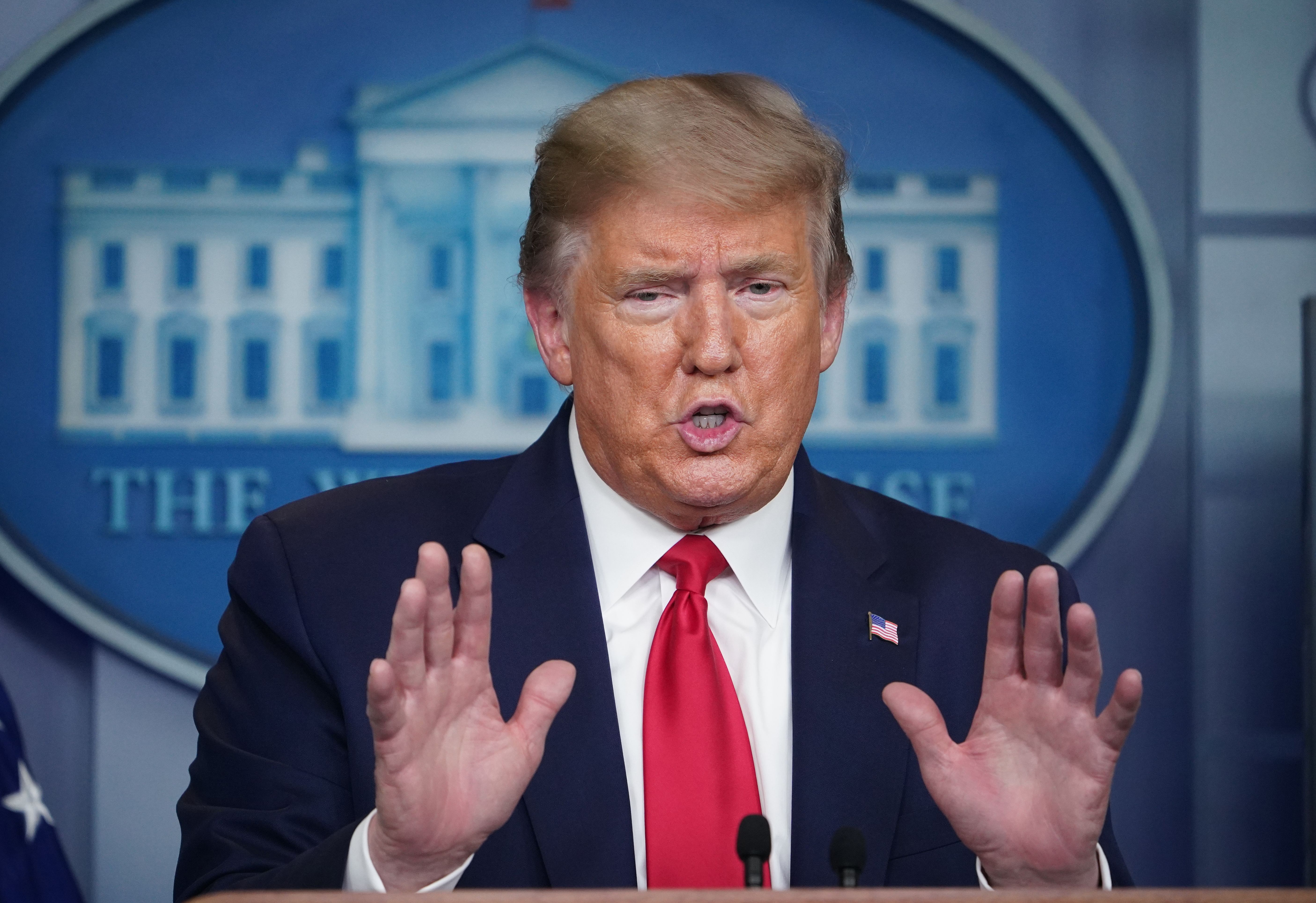10 things you need to know today: April 14, 2020
Trump lashes out at critics during coronavirus briefing, Sanders endorses Biden, and more


- 1. Trump uses coronavirus briefing to attack critics
- 2. Sanders endorses Biden
- 3. Governors unite to plan for reopening regional economies
- 4. Navy confirms sailor from USS Theodore Roosevelt died of coronavirus
- 5. Supreme Court to hear arguments via telephone
- 6. Liberal beats Trump-backed incumbent for Wisconsin Supreme Court seat
- 7. Trump administration asks Congress to extend census deadlines
- 8. Death toll from violent storms reaches 30 in South
- 9. Immigration detainees say protective gear scarce in detention centers
- 10. ESPN asks highest paid talent to take pay cut
1. Trump uses coronavirus briefing to attack critics
President Trump used Monday's White House coronavirus briefing to push back against criticism of his administration's handling of the crisis. Before experts were given time to update the public on the crisis, Trump presented a campaign-style video to portray his response as timely, and lashed out at critics and press coverage, particularly over the administration's failure to act aggressively to prevent the outbreak from spreading in February. "We really have done this right. The problem is the press doesn't cover it the way it should be," Trump said. The U.S. death toll from coronavirus rose to more than 22,000, with more than 580,000 confirmed cases. The number of cases worldwide has reached roughly 2 million.
2. Sanders endorses Biden
Sen. Bernie Sanders (I-Vt.) on Monday endorsed his former rival for the Democratic presidential nomination, Joe Biden. "We need you in the White House," Sanders told the former vice president. "And I will do all that I can to see that that happens." Biden responded by telling Sanders: "I'm going to need you. Not just to win the campaign, but to govern." Sanders' formal support was seen as a strong signal to Sanders' intensely loyal followers, and a potentially important factor as Biden tries to win over young progressives. An expected endorsement from another of the primary field's top progressives, Sen. Elizabeth Warren (D-Mass.), could reinforce Biden's pitch to progressives.
The Week
Escape your echo chamber. Get the facts behind the news, plus analysis from multiple perspectives.

Sign up for The Week's Free Newsletters
From our morning news briefing to a weekly Good News Newsletter, get the best of The Week delivered directly to your inbox.
From our morning news briefing to a weekly Good News Newsletter, get the best of The Week delivered directly to your inbox.
3. Governors unite to plan for reopening regional economies
Two groups of governors, one from the East Coast and the other from the West, announced Monday that they were joining forces to develop coordinated plans to eventually reopen their economies. The governors plan to roll back coronavirus restrictions slowly, to avoid new spikes of infections. New Jersey, New York, Connecticut, Pennsylvania, Delaware, and Rhode Island are forming the Eastern regional council, while California, Washington, and Oregon are forming the Western one. The announcement came as the White House unveiled its new council to stimulate the federal economy and reopen businesses. President Trump, who has said he hopes to reopen parts of the economy as soon as possible, said he had the "total" authority to overrule the governors. "The president of the United States calls the shots," he said.
4. Navy confirms sailor from USS Theodore Roosevelt died of coronavirus
A sailor from the USS Theodore Roosevelt, whose captain was ousted after warning of a coronavirus outbreak, has died from COVID-19 complications, the Navy confirmed on Monday. The sailor, whose name wasn't released, tested positive for the coronavirus on March 30 and was admitted into intensive care on April 9. This is the first confirmed death of one of the ship's sailors from COVID-19. More than 500 sailors from the USS Theodore Roosevelt have tested positive for the coronavirus, and four more sailors were reportedly admitted to the hospital over the weekend. Earlier this month, Capt. Brett Crozier was relieved of duty after writing a letter sounding the alarm about a coronavirus outbreak on the USS Theodore Roosevelt, writing "sailors do not need to die" and calling for action "now."
A free daily email with the biggest news stories of the day – and the best features from TheWeek.com
5. Supreme Court to hear arguments via telephone
From May 4 to May 13, the Supreme Court will hear arguments for 10 cases over the phone for the first time in its history. While some state and federal courts have heard cases remotely for a while, this is the first time the Supreme Court will hear arguments without physically being together. The court's next session will include a case on faithless electors in the electoral college and a case combining House Democrats' and New York state prosecutors' subpoenas for President Trump's financial records. The Supreme Court has already delivered decisions remotely since the COVID-19 pandemic began, though that wasn't a new practice for the court. The decision to let Wisconsin's primary continue during the pandemic was delivered remotely, but the court had postponed future arguments until deciding to proceed on Monday.
6. Liberal beats Trump-backed incumbent for Wisconsin Supreme Court seat
Democrats won a significant victory in Wisconsin's election for a state Supreme Court seat on Monday when the liberal challenger was declared the upset winner of last week's election over a conservative incumbent backed by President Trump. The liberal candidate, Jill Karofsky, beat Justice Daniel Kelly by more than 90,000 votes as of Monday night, a margin of victory that surprised members of both parties in a potentially crucial presidential battleground state. Also, former Vice President Joe Biden was declared the winner of last week's controversial Wisconsin presidential primary, which was held despite a last-minute effort by the state's governor to delay in-person voting due to the coronavirus outbreak. Biden, the presumptive Democratic nominee, handily won against Sen. Bernie Sanders (I-Vt.), who has since suspended his campaign and endorsed Biden.
7. Trump administration asks Congress to extend census deadlines
The Trump administration on Monday urged Congress to push back data collection deadlines for the 2020 Census as the country enters its second month of coronavirus shutdowns. The Census Bureau earlier delayed the deadlines by weeks and suspended field operations, but now the Trump administration wants Congress to allow several more months for census forms to be collected and tallied. The new plan calls for reopening field offices in June and allowing data collection to continue to Oct. 31, rather than stopping in mid-August as currently planned. The deadline for delivering redistricting data to states would be pushed back by four months to July 31, 2021.
8. Death toll from violent storms reaches 30 in South
The death toll from violent storms and tornadoes that crashed through the South rose to at least 30 people on Monday. It was the deadliest flurry of tornadoes in the United States in six years. More than 1 million homes and businesses lost power as dozens of tornadoes were reported. Eleven people were killed in Mississippi, nine in South Carolina, and eight in Georgia. Falling trees and other wind damage also killed people in Arkansas, North Carolina, and Tennessee. Forecasters said the region would get calmer weather on Tuesday, with a slight chance of continuing severe weather in pockets of southern Georgia and Florida but only a low threat of more tornadoes.
9. Immigration detainees say protective gear scarce in detention centers
Detained asylum seekers are calling for guards to give them masks to help prevent the spread of coronavirus, The Associated Press reported Monday. Three detainees told the AP that guards in the Otay Mesa Detention Center, run by a private prison company in San Diego, refused to hand over masks until detainees signed a form saying they could not hold the company liable if they were infected with the COVID-19 coronavirus. U.S. Immigration and Customs Enforcement has started to reduce the number of people in detention in an effort to prevent the spread of the virus. The number of coronavirus cases at Otay Mesa Detention Center jumped from one case to 12 last week. Seventy-two detainees in 12 states have now tested positive.
10. ESPN asks highest paid talent to take pay cut
ESPN on Monday asked about 100 of its highest paid commentators, writers, and analysts to accept a voluntary pay cut to help save the jobs of colleagues as college and professional sports remain on hiatus due to the coronavirus crisis. The cuts would last three months and amount to 3.75 percent of the affected employees' annual salaries. "Today, I am asking you something that I never imagined I would," ESPN President Jimmy Pitaro said to the selected employees in a Monday email that was obtained by The Washington Post. ESPN executives already have taken a pay cut of 20 percent to 30 percent, depending on their seniority level. ESPN's parent company, Disney, recently announced it would furlough thousands of workers due to the crisis.
Harold Maass is a contributing editor at The Week. He has been writing for The Week since the 2001 debut of the U.S. print edition and served as editor of TheWeek.com when it launched in 2008. Harold started his career as a newspaper reporter in South Florida and Haiti. He has previously worked for a variety of news outlets, including The Miami Herald, ABC News and Fox News, and for several years wrote a daily roundup of financial news for The Week and Yahoo Finance.
-
 Norway’s scandal-hit royals
Norway’s scandal-hit royalsIn the Spotlight Rape trial of Marius Borg Høiby, son of the crown princess, adds to royal family's ‘already considerable woes’
-
 The Beckhams: the feud dividing Britain
The Beckhams: the feud dividing BritainIn the Spotlight ‘Civil war’ between the Beckhams and their estranged son ‘resonates’ with families across the country
-
 Quiz of The Week: 24 – 30 January
Quiz of The Week: 24 – 30 JanuaryQuiz Have you been paying attention to The Week’s news?
-
 10 things you need to know today: January 24, 2024
10 things you need to know today: January 24, 2024Daily Briefing Trump closes in on nomination with New Hampshire win over Haley, 'Oppenheimer' leads the 2024 Oscar nominations, and more
-
 10 things you need to know today: January 23, 2024
10 things you need to know today: January 23, 2024Daily Briefing Haley makes last stand in New Hampshire as Trump extends polling lead, justices side with US over Texas in border fight, and more
-
 10 things you need to know today: January 22, 2024
10 things you need to know today: January 22, 2024Daily Briefing DeSantis ends his presidential campaign and endorses Trump, the US and Arab allies push plan to end Gaza war, and more
-
 10 things you need to know today: January 21, 2024
10 things you need to know today: January 21, 2024Daily Briefing Palestinian death toll reportedly passes 25,000, top Biden adviser to travel to Egypt and Qatar for hostage talks, and more
-
 10 things you need to know today: January 20, 2024
10 things you need to know today: January 20, 2024Daily Briefing Grand jury reportedly convened to investigate Uvalde shooting response, families protest outside Netanyahu's house as pressure mounts for hostage deal, and more
-
 10 things you need to know today: January 19, 2024
10 things you need to know today: January 19, 2024Daily Briefing Congress averts a government shutdown, DOJ report cites failures in police response to Texas school shooting, and more
-
 10 things you need to know today: January 18, 2024
10 things you need to know today: January 18, 2024Daily Briefing Judge threatens to remove Trump from his defamation trial, medicine for hostages and Palestinians reach Gaza, and more
-
 10 things you need to know today: January 17, 2024
10 things you need to know today: January 17, 2024Daily Briefing The US strikes Houthi targets in Yemen a third time, Trump's second sex defamation trial begins, and more
